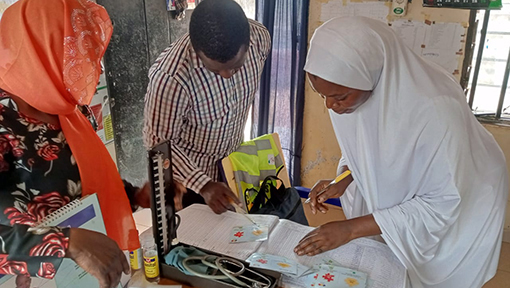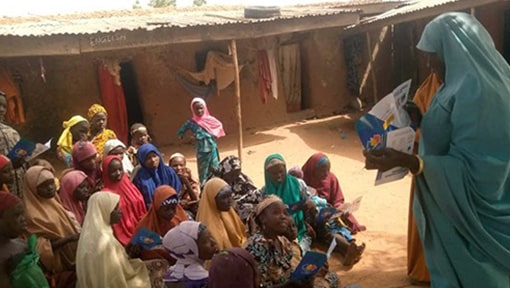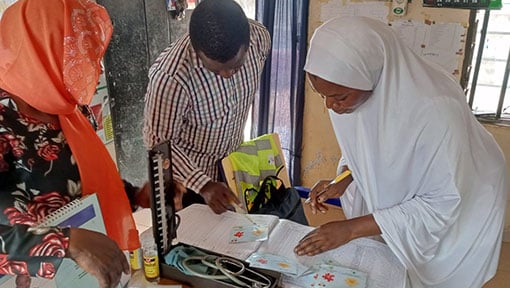A Request to Layer TB onto TCIHC’s Platform Leads to Positive Results
Contributors: Rajesh Singh, Devika Varghese
According to the World Health Organization, India has the highest burden of tuberculosis (TB), with two deaths occurring every three minutes from TB. But these deaths can be prevented with proper care and treatment. Given the effectiveness of The Challenge Initiative for Healthy Cities’ (TCIHC) coaching model for improving family planning and maternal and child health outcomes, USAID asked TCIHC in December 2018 to provide coaching support to strengthen government structures to more effectively identify, treat and care for TB patients. Following its Lead-Assist-Observe (LAO) coaching model, TCIHC began mentoring urban accredited social health activists (ASHAs) in TCIHC-sponsored cities on how to identify potential TB cases, counsel them and refer them to services for proper treatment and care.
Gwalior is a TCIHC city in Madhya Pradesh with a TB prevalence rate of 327 per 100,000 population. Annually, 6,800 patients are diagnosed with TB in Gwalior alone. A 2016 study conducted in three TB units in Gwalior found that most patients belonged to a low socio-economic strata (77.2%), dwelled in overcrowded houses (71.6%) and were in the age group of 16-30 years (40.2%). The study’s findings echo the experience of Poonam Batham, who is 23 years old and lives in Nadi Paar Taal, a slum of almost 2,000 people in Gwalior.
Poonam, who lives with her husband Sujit Batham, their two-year-old son and her mother-in-law, depends on daily labour to make ends meet. Her community strongly believes that TB is a result of a person being under the influence of black magic or an evil spirit. Additionally, the community elders believe women under the influence of this black magic cannot become mothers again and, therefore, must be isolated from family. People also believe TB can only be treated by traditional healers. Poonam’s mother-in-law believe Poonam was under the influence of black magic, coughing all day and losing weight. As a result, Poonam was isolated from her family members and the community avoided her.
During a routine household visit, an ASHA mentored by TCIHC observed Poonam’s condition and for the next few days repeatedly visited Poonam’s house to educate her mother-in-law and husband on TB care and the effectiveness of TB medication. They discussed government schemes for free medication and care from qualified doctors at medical facilities closer to their home. The AHSA convinced Poonam’s husband that she needed medical care and accompanied her to the district hospital. At the hospital, the doctor observed that Poonam was undernourished, weighing just 25 kilograms, and tested her sputum. Once the test results confirmed pulmonary TB, the ASHA supported Poonam in adhering to her treatment plan and making sure she had access to nutrition and care from family during her weekly household visits. Grateful for the ASHA’s intervention and follow-up with her and her family, Poonam said, “I have realized the life of hell and heaven in very short span of time.”
The coaching the ASHA received from TCIHC helped her to effectively support Poonam. The ASHA also dispelled myths about TB affecting fertility in the community. Because Poonam dreams of her son getting a good education and having a successful career away from the poverty of the slums, she and her husband decided that she would use an intrauterine contraceptive device (IUCD) so they would have time and resources to make her dream a reality. Poonam credits the AHSA’s counseling for the decision to adopt a family planning method.
Strengthening the capacity of ASHAs to change social norms and behaviors of vulnerable, under-served communities, strengthens the health system’s response to care for the urban poor. And once a platform is ready with demand generation activities, service delivery and an enabling environment, then several health interventions can be easily and effectively layered on to it. This can be a more efficient way of delivering services to the urban poor.
With this layering of TB services onto the TCIHC platform, the initiative now reaches 2.5 million people living in slums in five cities across Madhya Pradesh. TCIHC-coached ASHAs successfully reached 88,853 households with TB-related information and counseling and linked 3,479 potential TB cases to services for confirmatory diagnosis. As a result, 615 TB cases have been confirmed and linked to services for treatment, treatment adherence support and nutrition support in line with the Revised National Tuberculosis Control Program.






